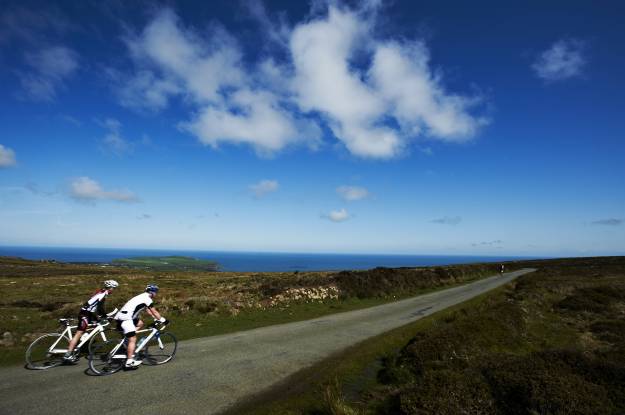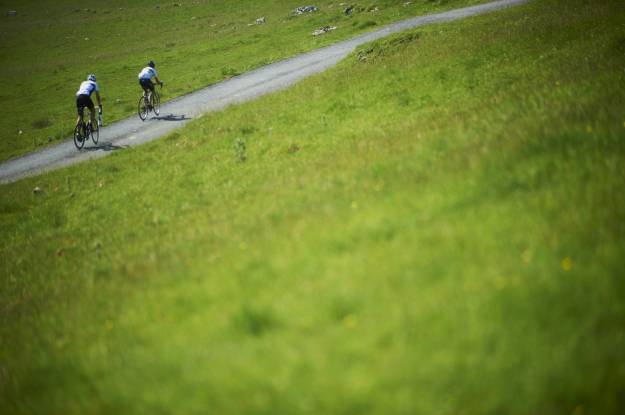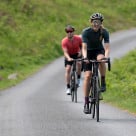London Mayoral candidates Boris Johnson, Ken Livingstone, Brian Paddick, Jenny Jones and Siobahn Benita today answered questions on cycle safety ahead of the 3 May mayoral elections.
 The hustings event was jointly hosted by The Times newspaper and Sustrans and began with The Times’ editor James Harding setting the scene and posing a question to all five candidates: “Cycling is not safe here. And we at The Times have been traumatised by this. A fantastically talented journalist in Mary Bowers was knocked off her bike six months ago and is yet to regain consciousness... ...If you get elected mayor on Thursday, what will be different for cyclists in two years time?"
The hustings event was jointly hosted by The Times newspaper and Sustrans and began with The Times’ editor James Harding setting the scene and posing a question to all five candidates: “Cycling is not safe here. And we at The Times have been traumatised by this. A fantastically talented journalist in Mary Bowers was knocked off her bike six months ago and is yet to regain consciousness... ...If you get elected mayor on Thursday, what will be different for cyclists in two years time?"
Incumbent Mayor Boris Johnson promised to expand cycle superhighways, install Trixi mirrors and install 68,000 Sheffield stands for bikes. However, Johnson was cautious on timescales for implementation - "I can't guarantee this will all be done within two years, but it will be well on the way." Johnson asserted that cycle superhighways "create confidence" and affirmed his commitment to the project. However, The Time’s editor James Harding said that a "splash of paint on the road" is not enough to protect cyclists. Johnson responded saying that Harding "misunderstands the expense and complexity of measures involved".
In a letter received by British Cycling on the eve of the hustings, Johnson promised to appoint a Cycling Commissioner and a cycling representative on the London Roads Task Force, a point which the mayor echoed at the hustings. However Johnson was unsure on the need for someone from a cyclists’ interest groups on the Board of TfL, as Johnson himself was a regular cyclist.
The Mayor was also quizzed by The Times editor on the accuracy of his cycling casualty figures - Boris insisting that figures have fallen in the past four years as a proportion of cycling journeys taken.
Johnson went on to say that there is "no cause for complacency" and that improvements “would mean some sometimes expensive interventions. You can't do these things with no cash. I cannot see how a Labour programme that involves cutting transport investment can deliver those improvements”, referring to mayoral rival Ken Livingstone’s plans to simultaneously cut public transport costs and develop cycling facilities.
As was expected it was current Mayor Johnson and Labour Candidate Ken Livingstone who were centre of attention. Livingstone, who began the work on improving London cycling provision in his previous term in office, promised that he would “reinstate on the first day the order of priorities to make cyclists and pedestrians number one for Transport for London." Livingstone went on to promise to refocus work on the London boroughs, a piece of work that was "so rudely interrupted four years ago". The Labour candidate also promised to give cyclists priority at left-turns at junctions and appoint Green candidate Jenny Jones to take head up cycling within TfL.
Later in the debate, Livingstone went on to say that he would be “quite happy for the London Cycling Campaign to have access to all the files in Transport for London" allowing the organisation regular input into plans for cycling provision.
Green Party candidate Jenny Jones promised to call on police to help enforce the law on the roads and ensure that advanced stop lines are enforced for the people who need to use them. When asked by Times editor Harding how she would improve cycle safety, Jones said that she would "reduce the traffic and slow it down."
Siobhan Benita, Independent candidate promised a "complete, relentless focus" on improving junctions design, creating segregated routes where possible. Benita reportedly arrived at the hustings in an HGV, fully kitted out with safety measures.
Brian Paddick, Lib Dem candidate called for more safety measures on lorries and promised to implement 20mph limits in busy areas in the first year of office. Paddick also promised to put pressure on local authorities to review their own roads, reviewing superhighway junctions and appoint a cycling commissioner on the board of the TfL, one of British Cycling’s key manifesto recommendations – putting cycling at the heart of transport decisions in the capital.
The hustings concluded with questions from the floor, most prominent of which came from Will Jefferies, brother of former British Cycling employee and well known track rider Rob Jefferies who was killed by an inexperienced driver in May 2011. The driver in the case, who had already been caught speeding, was given an £80 fine and community service, prompting outrage in the cycling community. Will Jefferies asked “what will the new mayor do to make sure that people who kill cyclists are properly sentenced?”
Johnson responded by flagging up that a newly created Sentencing Unit in the mayor’s office would be making representations to the Justice Department on sentencing. Brian Paddick responded by saying “People on bikes do not kill people in cars. It is the other way round. Therefore cyclists and pedestrian safety has to be the priority.”
LINK: British Cycling Road Safety Homepage









